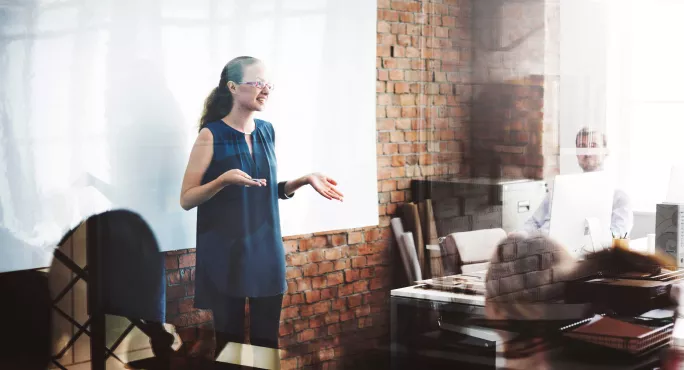- Home
- How female teachers can overcome ‘imposter syndrome’
How female teachers can overcome ‘imposter syndrome’

We often associate "being brave" with going into battle or surviving extreme adversity. But what if we were to redefine it in personal terms, as something that anyone can be, even if just a little bit?
The phrase “10 per cent braver” came from something my best friend once said to me. She had been on a training course, and the presenter had challenged the delegates: “What would you do today, if you were 10 per cent braver?”
The question stuck in my mind, because being 10 per cent braver doesn’t sound difficult or scary. It’s only a tiny leap, after all, not a huge jump over a chasm.
There are many systemic factors that can get in the way of women achieving their aspirations. We can get trapped into certain career paths, often based on how likely we feel we are to succeed or on the role models that we see around us. A lack of confidence can translate into missed opportunities, which is why a key focus of the WomenEd movement is supporting women to be 10 per cent braver. When you are figuring out how to do this, ask yourself: if you could do anything, regardless of what it was, where it was, or how much it paid, what would you do?
It is the times when I have asked myself this question, and gone with whatever the answer was, that I have had the best adventures. I left school at 16, and would never have become a teacher if I had not taken the leap to go to university as a mature student. If I had not decided to write my first book while waiting for a teaching job overseas to start, I might not be a writer now. One of my recent adventures involved taking our children out of school to educate them "on the road" for six months. That trip started with me saying, “I want to go travelling," and ended up with a book called Road School.
As a woman teacher, be 10% braver
A great way to help yourself to be more confident about taking leaps is to consider the worst thing that could happen. When you do, you realise that your "worst thing" doesn’t actually sound too bad. Women need to overcome "imposter syndrome" – the feeling that we are "faking it" – that we cannot deserve the success we achieve on our own terms. We often have a difficult relationship with our achievements. While we might be able to acknowledge them to ourselves, the idea of talking about what we have achieved to others feels a step too far. Laura Henry, an early years colleague and founder of the @EYTalking network, regularly reminds me of what Muhammad Ali said: “It’s not boasting if you can back it up."
When I work with teachers, I explain how it is good for educators to be 10 per cent braver – to take creative leaps and not take ourselves too seriously. Rather than teachers being all-knowing authorities who can never do any wrong, why not show ourselves as people who are willing to make mistakes and to take risks? Sometimes the risks pay off, sometimes they don’t – that is the nature of the creative process and of being a teacher. If you spend your life worrying that others will think you foolish, you will struggle to achieve your dreams. But if you ask yourself, "What would I do today if I was 10 per cent braver?" and then you just go ahead and do it, you might be surprised at the result.
The new book from the team behind the WomenEd movement, 10% Braver, is a timely and important call to arms. It covers diverse topics, giving advice and insight into what it means to be an authentic leader, in many contexts. We learn that, while 62 per cent of the secondary workforce is female, only 36 per cent of heads are.
We hear about the negative impact of gendered imagery – the horror of a pink babygro emblazoned with "I hate my thighs" while a blue one has "superhero". We learn how the WomenEd movement is having a global impact, and we gain an insight into the experiences of black and minority ethnic female leaders. We hear about the difficulties of being a female leader who does things differently, in a system where unconscious bias and discrimination are entrenched. A male head tells us why he is an advocate of #WomenEd and #HeforShe, and we learn how to foster a flexible working culture in our schools.
The book is filled with positive ideas for taking leaps and making changes, at a personal and system wide level.
Sue Cowley is an author, teacher educator and presenter. Her chapter on being 10 per cent braver features in the new WomenEd book, which will be published on 9 March 2019
If you’d like to learn more about #WomenEd, you can find it on social media, or you can sign up for its newsletter here
Keep reading for just £1 per month
You've reached your limit of free articles this month. Subscribe for £1 per month for three months and get:
- Unlimited access to all Tes magazine content
- Exclusive subscriber-only stories
- Award-winning email newsletters



